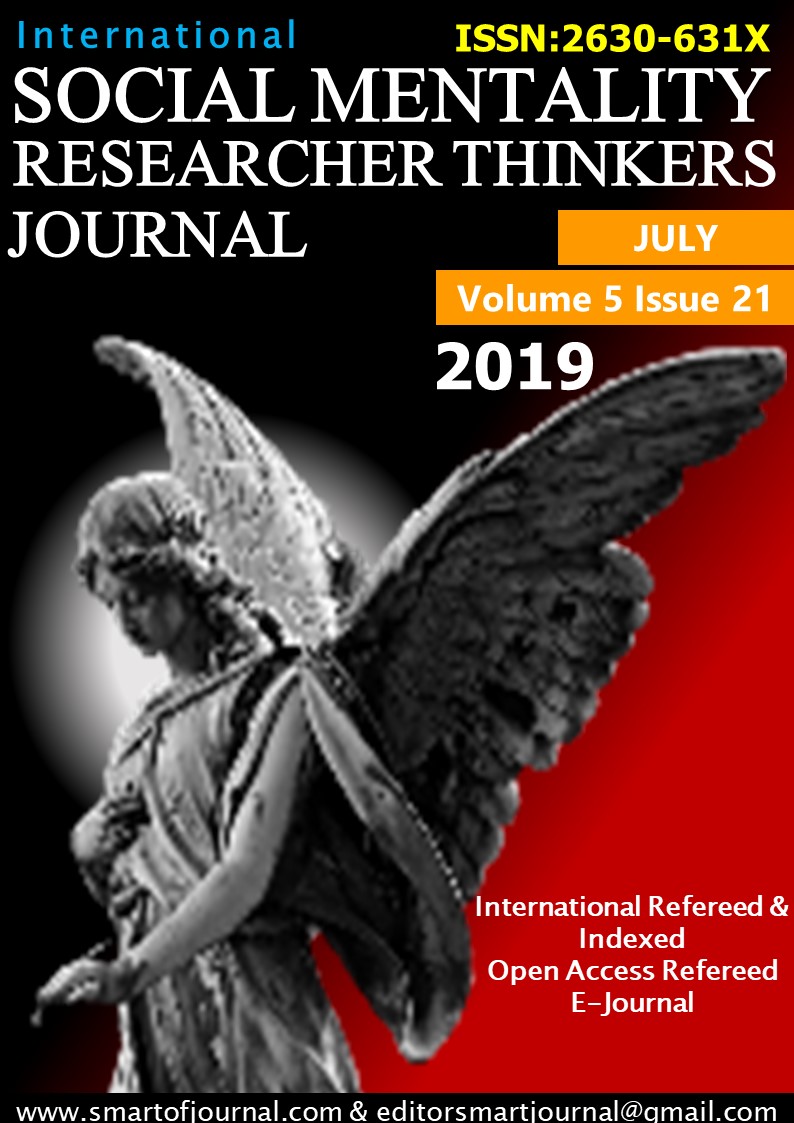Author :
Abstract
Bu araştırmada, üstün yetenekli öğrencilerin anne baba algılarının etiket etkileri açısından incelenmesi amaçlanmıştır. Aynı zamanda yaş, cinsiyet, anne baba eğitim durumu, gelir düzeyi, okul niteliği, kardeş sayısı ve doğum sırası gibi değişkenler ile incelenmiştir. Toplumda var olan genel kalıplarının dışında davranışlar sergilediğinde, farklı düşüncelere ve özelliklere sahip olduğunda olumsuz etiketlenmelere maruz kalınabilmektedir. Araştırma üstün yetenekli öğrencilerin etiket etkilerinin belirlendiği ve değişkenler arasındaki bağlantıların incelendiği betimsel bir çalışma olduğu için ilişkisel tarama modeli kullanılmıştır. Araştırmanın evreni tüm İstanbul ilindeki üstün yetenekli öğrenciler, örneklemi ise Üsküdar ilçesinde 2018-2019 eğitim yılı kapsamında Üsküdar Çocuk Üniversitesi’nde Wisc-r ve Wisc-4 test sonucuna göre tanı alan 10-13 yaş aralığındaki 300 öğrenciden oluşmaktadır. Örneklem grubu benzeşik örnekleme yöntemi ile belirlenmiştir. Uygulanan ölçekler ise Bilgi formu, Üstün Zekâ Etiket Etkileri Ölçeği ve Beier Cümle Tamamlama Testi A formudur. Araştırmada SPSS 19.0 programı ile Shapiro Wilk Testi, Nonparametrik Testler ve Spearman Korelasyon analizleri kullanılmıştır. Bütün istatistiksel analizlerde p<0,05 anlamlılık düzeyi olarak kabul edilmiştir. Verilerin sonuçlarına göre öğrencilerin üstün zekâ etiketi aldıktan sonra anne baba algılarında herhangi bir farklılık görülmemiş ve genel olarak olumlu algıya sahip olduğu görülmüştür. Detaylı olarak incelendiğinde öğrencilerin yaşı arttıkça babaya karşı algısının olumsuz yönde etkilendiği ortaya çıkmıştır. Analiz sonucunda araştırmaya katılan kız öğrencilerin Cümle Tamamlama Testine verdiği cevaplara göre; babaya karşı pozitif değeri erkek öğrencilere göre daha olumlu olduğu saptanmıştır. Ayrıca çalışmaya katılanların ilk çocuk oldukları ve genellikle üstün yetenek tanısı aldığı ortaya çıkartılmıştır.
Keywords
Abstract
Target of this study is to analyze labeling effects on gifted student’s mom and father perceptions. The research is examined together with variables such as private and state school, age, parental education level, financial income level, number of sibling and birth order. Negative labeling may be exposed when it exhibits behaviors outside the general patterns existing in society and has different thoughts and characteristics. The study consists determination of gifted students labeling effects. Rational screening model has been used due to study being descriptive where relation in between variables are analyzed. Research population consists 300 students of Üsküdar Children’s University between ages 10-13 of the 2018-2019 academic year which are diagnosed as gifted according to the Wics-r and Wics-4 tests. The applied scales are the information form, ÜZETÖ and CTT A form. Shapiro Wilk Test, Nonparametric Tests and Spearnan Correlation analyzes were used with SPSS 19.0 program. In all statistical analyzes, p<0.05 was considered significant. As a result, it was found that there was no difference between the student’s perceptions of the mother and father figures after receiving the intelligence label. When the variables were examined in detail, it was found that as the age of the students increased, father perception was negatively affected. According to the answers given to the Sentence Completion Test of the female students who participated in the research as a result of the analysis; the positive value towards the father was found to be more positive than male students. In addition, it was found that the participants were the first children and were generally diagnosed with giftedness.
Keywords
- Akkoyun, F. (2014). Projektif Teknikler. Ankara: Nobel Akademik Yayıncılık.
- Ataman, A. (2011). Özel Gereksinimli Çocuklar ve Özel Eğitime Giriş. Ataman A. (Ed.). Ankara:
- Gündüz Eğitim ve Yayınları. Akkanat, H. (1999). Üstün veya Özel Yetenekliler. Milli Eğitim Bakanlığı Dergisi. Sayı: 103.
- Baltacı, R. (2017). “Üstün zekâ tanısının öğrencilerin çeşitli algıları üzerindeki etkisinin
- Becker, H. (1963). The Outsiders; Studies in The Sociology of Deviance. New York. Free Press.
- Cornell, D.G. (1983). Gifted Children: The İmpact of Positive Labeling on The Family System.
- Dağlıoğlu, H. E. & Alemdar, M. (2010). Üstün Yetenekli Bir Çocuğun Ebeveyni Olmak.
- Erol, F. (2015). “Üstün zekâlı ergenlerin akran ilişkileri ile öznel iyi oluşları arasındaki ilişkinin
- Goffman, E. (2014). Damga: Örselenmiş Kimliğin İdare Edilişi Üzerine Notlar. Çev. L. S. Ş. Geniş.
- Kadıoğlu, M. ve Hotun Şahin, N. (2015). Stigmatizasyon (Damgalama) ve Kadın. Sağlık ve
- Kahraman, S. & Ogurlu, Ü. (2013). Üstün Yetenekli Çocuk ile Kardeşleri Arasındaki İlişki. V.
- Karakuş, F. (2010). Üstün Yetenekli Çocukların Anne Babalarının Karşılaştıkları Güçlükler. Mersin
- Karakuş, F. (2014). Üstün Yetenekli Çocukları Olan Anne Babaların Çocuklarının Eğitimine
- Lamb (1987). M. The father's role cross cultural perspectives. Lawrence erlbaum.
- Link, B.G. and Phelan, J.C. (2001). Conceptualizing Stigma. Annu. Rev. Sociol. 27: 363-385.
- Öpengin, E. (2011). “Üstün Zekâlı Öğrencilerin Bakış Açısıyla Üstün Zekâ Etiketinin Öğrencilerin
- Özkardeş, Arkonaç (1998). İki Farklı Eğitim Düzeyinde Baba Olma Algısı. M.Ü Atatürk Eğitim
- Özkardeş, O. (1992). Çocuğun Zekası, Akademik Başarısı ve Benlik Kavramı Üzerinde Babanın
- Recepov, R. (2000). Algılanan Ana-Baba Davranışları (Kültürler Arası Bir Karşılaştırma),
- Robinson, A. (1986). Brave New Directions: Needed Research on The Labeling of Gifted Children.
- Sak, U. (2017). Üstün Zekâlılar: Özellikleri, Tanılanmaları, Eğitimleri. Ankara: Maya Akademi.
- Silverman K. Linda and Lubart I. Todd, (1997). Creative Giftness in Childiren, To be Young and
- Span, P. (1991). Üstün Yeteneklilerin Belirlenme ve Eğitiminin Ulusal Sisteme Adaptasyonu. İnanç
- Tannenbaum, Abrahams J. Early (1992). Sign Sof Giftedness: Research an Commentary, Tobe
- Tortop, H. S. (2015). Üstün Yetenekliler Üniversite Köprüsü Eğitim Programı ÜYÜKEP Modeli.
- Webb, J., Amend, E., Webb, N. ve Goerss, J. (2013). Misdiagnose van Hoogbegaafden:
- Webb, James T., Gore Janet L. Amend, Edward R., DeVries, Arlene R. (2016). Üstün Yetenekli
- Yavuzer, H. (1999). Ana-Baba ve Çocuk. 10. Baskı. İstanbul: Remzi Kitapevi.
- Yıldırım, A., Şimşek, H. (2003). Sosyal Bilimlerde Nitel Araştırma Yöntemleri. Ankara: Seçkin





